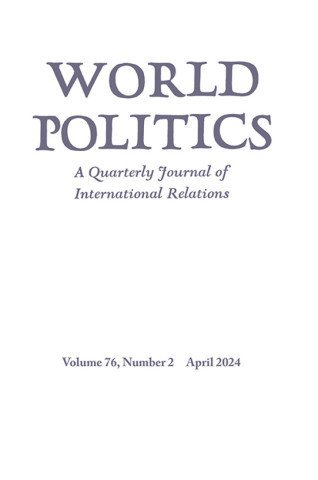为什么非民主与西方民主促进计划
IF 2.5
1区 社会学
Q1 INTERNATIONAL RELATIONS
引用次数: 3
摘要
在20世纪90年代中期至2010年代中期,中国政府对西方提供的民主援助项目明显持开放态度。它与一些西方组织合作,改善了中国的法治、村选举、行政能力和公民社会。为什么中国政府与那些试图在中国发展这些民主属性的民主推动者接触?作者认为,政府打算利用西方的援助为自己谋利。中国共产党已经启动了治理改革,以加强其政权的合法性,中国官员发现,西方的民主援助可以用来促进他们自己的治理改革计划。这篇文章追溯了政府的战略意图如何转化为选择性开放政策的过程,并包括来自第一手采访、宣传材料和中国专家研究的证据。研究结果表明,民主推动者和威权领导人对有限的民主改革在非民主制度中的效果有不同的预期。从经验上看,反思中国与西方交往的所谓黄金年代,可以让我们对中国共产党通过威权合法化的生存策略有新的认识。本文章由计算机程序翻译,如有差异,请以英文原文为准。
Why Non-Democracy Engages with Western Democracy-Promotion Programs
ABSTRACT Between the mid-1990s and the mid-2010s, the Chinese government was distinctly open to the Western offer of democracy-assistance programs. It cooperated with a number of Western organizations to improve the rule of law, village elections, administrative capacity, and civil society in China. Why did the Chinese government engage with democracy promoters who tried to develop these democratic attributes within China? The author argues that the government intended to use Western aid to its advantage. The Chinese Communist Party had launched governance reforms to strengthen its regime legitimacy, and Chinese officials found that Western democracy assistance could be used to facilitate their own governance-reform programs. The article traces the process of how the government’s strategic intention translated into policies of selective openness, and includes evidence from firsthand interviews, propaganda materials, and research by Chinese experts. The findings show how democracy promoters and authoritarian leaders have different expectations of the effects of limited democratic reform within nondemocratic systems. Empirically, reflecting on the so-called golden years of China’s engagement with the West sheds new light on the Chinese Communist Party’s survival strategy through authoritarian legitimation.
求助全文
通过发布文献求助,成功后即可免费获取论文全文。
去求助
来源期刊

World Politics
Multiple-
CiteScore
8.40
自引率
0.00%
发文量
24
期刊介绍:
World Politics, founded in 1948, is an internationally renowned quarterly journal of political science published in both print and online versions. Open to contributions by scholars, World Politics invites submission of research articles that make theoretical and empirical contributions to the literature, review articles, and research notes bearing on problems in international relations and comparative politics. The journal does not publish articles on current affairs, policy pieces, or narratives of a journalistic nature. Articles submitted for consideration are unsolicited, except for review articles, which are usually commissioned. Published for the Princeton Institute for International and Regional Affairs
 求助内容:
求助内容: 应助结果提醒方式:
应助结果提醒方式:


